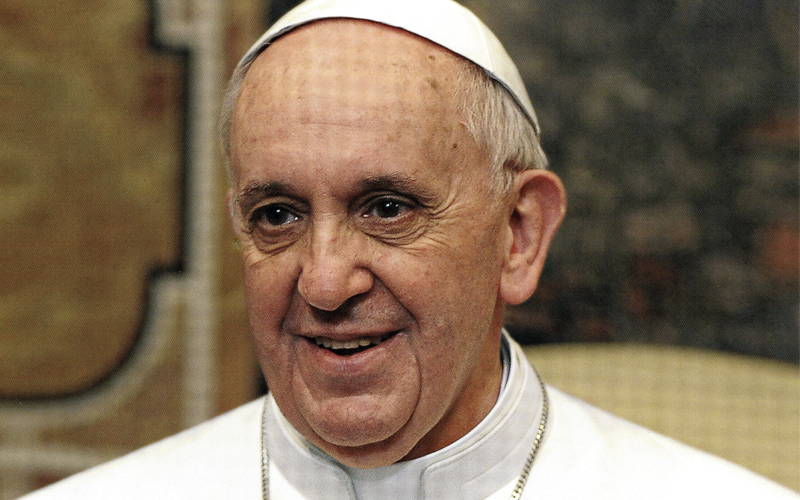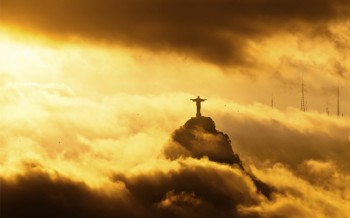So Jesus called them all together and said, “You know that the rulers of the heathen have power over them, and the leaders have complete authority. This, however, is not the way it shall be among you. If one of you wants to be great, you must be the servant of the rest; and if one of you wants to be first, you must be the slave of the others— like the Son of Man, who did not come to be served, but to serve and to give his life to redeem many people.” Matthew 20.25-28 GNT
To mark the first anniversary of Pope Francis’ Pontificate, American Bible Society hosted a special forum featuring keynote presenter Sean Patrick Cardinal O’Malley, Archbishop of Boston.
Cardinal O'Malley, one of eight consultants to Pope Francis, has close contact with the Holy Father and shared key insights about him, his vocation and his love of the poor.
Among the most moving was the story of the Holy Father’s calling. Quoting Pope Francis, Cardinal O’Malley said: “It was a September day when the loving face of God crossed my path and invited me to follow him.” A young man of 17 at the time, Pope Francis knew this encounter would change him forever.
This idea of a living encounter with Christ stands at the heart of Pope Francis’ life and mission. It underlies his work with the poor and his central message that God is loving, compassionate and merciful.
Describing Pope Francis as a man “comfortable in his own skin,” Cardinal O’Malley said this reality was seen with “striking clarity” when he celebrated Holy Thursday mass last year in a detention center. His decision to wash the feet of prisoners shocked and surprised many.
But Pope Francis simply lived anew the gospel story of Jesus washing the feet of his disciples. In doing so, he “challenged our assumptions about power, authority and leadership,” said Cardinal O’Malley—just as Jesus did.
This practice of washing the feet of the “least of these” is nothing new to Pope Francis. When serving as cardinal in Argentina, he routinely washed the feet of prisoners on Holy Thursday. The act is no longer a symbolic ritual, but a living example of love.
Pope Francis has made serving the poor the emblem of his papacy. He believes God has a special love for them. His love is so striking, in fact, that he sent his own son who became poor just like us.
“The worst discrimination the poor suffer is the lack of pastoral care,” Cardinal O’Malley quoted the pope as saying. “We must not fail to offer them God’s friendship and love.”
So determined is he that when he taught seminarians in Argentina, he insisted they go to the poorest neighborhoods to teach them the catechism. “He’d check the dust on their shoes to make sure they went,” Cardinal O’Malley said. “And if there was no dust, they’d have some explaining to do.”
A man who believes in the Jesuit principle of discipline, Pope Francis doesn’t like to waste anything: time, money, resources. Cardinal O’Malley shares the image of “Pope Francis tooling around the Vatican turning out the lights. He sort of reminded me of my own dad,” joked the Cardinal.
Pope Francis’ simplicity, compassion and humble “style” have earned him “celebrity status,” a designation he emphatically rejects. “I am just a human being like everyone else,” he is quoted as saying in the media.
But he’s modeling his life after the one who was fully human and fully divine. In doing so, he’s showing the rest of us the “way, the truth and the life.”
Pope Francis’ Culture of Encounter Captures Hearts
Cardinal O’Malley fields questions from journalists about the Holy Father
As part of its forum to mark the first anniversary of Pope Francis’ Pontificate, American Bible hosted a distinguished panel of journalists, who asked questions about Pope Francis to keynote speaker Cardinal O’Malley.
As one of eight advisors to the Pope, Cardinal O’Malley has special access to the Holy Father. Here are a few questions that were asked, along with Cardinal O’Malley’s response.
Kenneth Woodward
Former religion editor, Newsweek
Q: Does the Pope understand capitalism as we understand it in the United States, or does he just understand it from a Latin American perspective?
A: The Holy Father isn’t an economist. He sees the suffering of the world … and is lifting up the social teachings [of the church] and his love of the poor. He’s not coming from an economic school, but is simply looking at the injustices that are out there. There’s a lot of it because of people’s sinfulness and greed and the globalization of indifference.
Rev. Fr. Matt Malone
Editor in Chief, America Magazine
Q: How concerned should we be about the Pope’s celebrity? We’re focused on this man in a very intense way. Are we elevating the papacy in its importance?
A: The Holy Father eschews this kind of celebrity, but it seems that the more he runs from it, the more it follows him. People are fascinated by his style, his desire to be with people. This culture of encounter in a culture of alienation strikes a chord in people’s hearts.
R.R. Rusty Reno
Editor, First Things Magazine
Q: Tell us about the image of a spiritual leader without security guards all around him.
A: Pope Francis has refused to be isolated. He wants to be with people. The way he calls people on the telephone, shakes the hands of the Swiss Guards…he has this connection with people, and it’s a reminder of what the Church is supposed to be about. We must love each other as Christ loves us. He’s modeling that in a very beautiful way, and it’s certainly touching people.
Read more posts about: Bible Basics
Thanks to the support of our faithful financial partners, American Bible Society has been engaging people with the life-changing message of God’s Word for more than 200 years.
Help us share God's Word where
needed most.
Sign up to receive free coloring pages and regular email updates from the Bible Blog.




